- Justified Concerns: In some cases, restrictive gatekeeping may be justified, particularly when it aims to protect the child from potential harm due to the other parent’s abusive or neglectful behavior. However, proving these concerns can be challenging and may lead to further conflict in custody disputes.
- Gender Bias: There is controversy over the term due to perceived gender biases, with some arguing that mothers are more often accused of gatekeeping, sometimes unfairly, as a tactic in custody battles. This can complicate custody disputes and lead to further polarization between parents.

Can you negotiate with a narcissist?
Can you negotiate with a narcissist?
ABSOLUTELY yes.
People will tell you that it is impossible to negotiate with a narcissist, and they are partially right. It is nearly impossible to get a narcissist to compromise on something they know is important to you and will cause chaos and drama to argue about.
But that doesn’t mean you can’t negotiate with a narcissist. It just means you have to be strategic about doing so.
There is a story that I read after my divorce that sticks with me. A question had been asked on a FB page about strategies for mediating with a personality disordered individual. One woman responded that she had made a HUGE deal about a hairbrush in her divorce. Instead of fighting over the kids, she kept going on and on about this brush. She didn’t actually care about the hairbrush, but the narcissist latched on to this being an important item. So he fought her over it. She ended up leveraging this brush – that she never actually wanted – to get the things she actually did want in the end. Is there something in your situation that you can make up to fight about?
In my own case, I used this a few times (though made the mistake in mediation and our custody modification of thinking that if I just told the other people exactly what I wanted, we could figure it out). I knew that we were up against a situation where ex was saying that abuse allegations were made up. I also knew that eventually a court would try to order counseling for the kids with their dad. He had already snowed a psychiatrist, a social worker, and a forensic psychologist. I was pretty sure he could do the same for the kids’ counselors. And I also knew that counseling with their dad wouldn’t actually be effective. So I would regularly ask him to go to counseling with the kids (like once a month or so). It became a way to control what was being argued over, which helped things stay calmer outside of that one “disagreement.”
Another strategy for negotiating with a narcissist is to appeal to their ego. When you send an email and want them to agree to something, you can add phrases like “I wasn’t sure about the kinds of lunches I needed to pack for [child]. I know that you care about healthy lunches. What do you think we should pack for school?” if the other parent isn’t sending the kids to school with appropriate food. You can even try “Good parents love watching their kids play soccer, and I know you are trying to be a good dad.” You don’t have to believe it. You are just focusing on getting your desired outcome. It’s crucial to frame your negotiations in a way that appeals to the narcissist’s self-interest and reinforces their sense of power and control.
The worst thing you can do when negotiating with a narcissist is to get overly emotional. It’s where the work learning gray rock is important, even if you use a modified version in your regular communications. If you are unemotional, disimpassioned, and neutral during most of the negotiations, but you get emotional in your disagreements over the proverbial hairbrush, then you are setting yourself up to be in more control during the negotiation.
Can you negotiate with a narcissist? Yes. Does it take practice and strategic thinking? Absolutely!
Learn MoreWhat is post separation abuse?
Post-separation abuse refers to the ongoing abuse that occurs after a relationship has ended, typically in cases where there was already a pattern of domestic violence or coercive control during the relationship. While many people assume that the abuse stops once a couple separates, post-separation abuse demonstrates that an abuser’s need for control often continues, especially when there are children involved or shared assets. This type of abuse can take various forms, including emotional manipulation, financial control, legal harassment, and interference in co-parenting.
One of the most common forms of post-separation abuse is legal harassment, sometimes referred to as “abuse by the court” or vexatious litigation. Abusers frequently misuse the family court system to maintain control over their ex-partner by filing frivolous lawsuits, requesting unnecessary hearings, or constantly seeking modifications to custody arrangements. This not only drags out the legal process, costing the victim time and money, but also keeps them emotionally entangled in the conflict. Legal abuse can feel like an endless cycle, as victims are repeatedly forced to engage with their abuser in court.
Financial abuse is another significant aspect of post-separation abuse. Even after separation, abusers may withhold child support or spousal support, refuse to divide shared assets, or purposely drag out financial negotiations. In some cases, they may also engage in “economic sabotage,” such as quitting a job or hiding assets to avoid financial responsibilities, making it difficult for the victim to achieve financial independence.
For those with children, post-separation abuse often takes the form of co-parenting sabotage. Abusers may use children as pawns to continue controlling their ex-partner. They might refuse to follow custody agreements, withhold the children during visitation, or make unfounded accusations of parental alienation. In extreme cases, they may engage in emotional manipulation of the children, turning them against the other parent, a term many call Domestic Violence by Proxy. This form of abuse is particularly damaging to children, who become caught in the crossfire of the abuser’s attempts to maintain power.
It’s important to recognize that this can be just as harmful as abuse that occurs during the relationship. Survivors often need ongoing support, both legal and emotional, to navigate this phase of the abuse. Family courts are becoming more aware of these dynamics, and some states are implementing laws to address issues like legal harassment and coercive control. However, victims of post-separation abuse still face significant challenges in protecting themselves and their children from ongoing harm.
Post Separation Abuse Power and Control Wheel
(Credit: One Mom’s Battle, Tina Swithin)
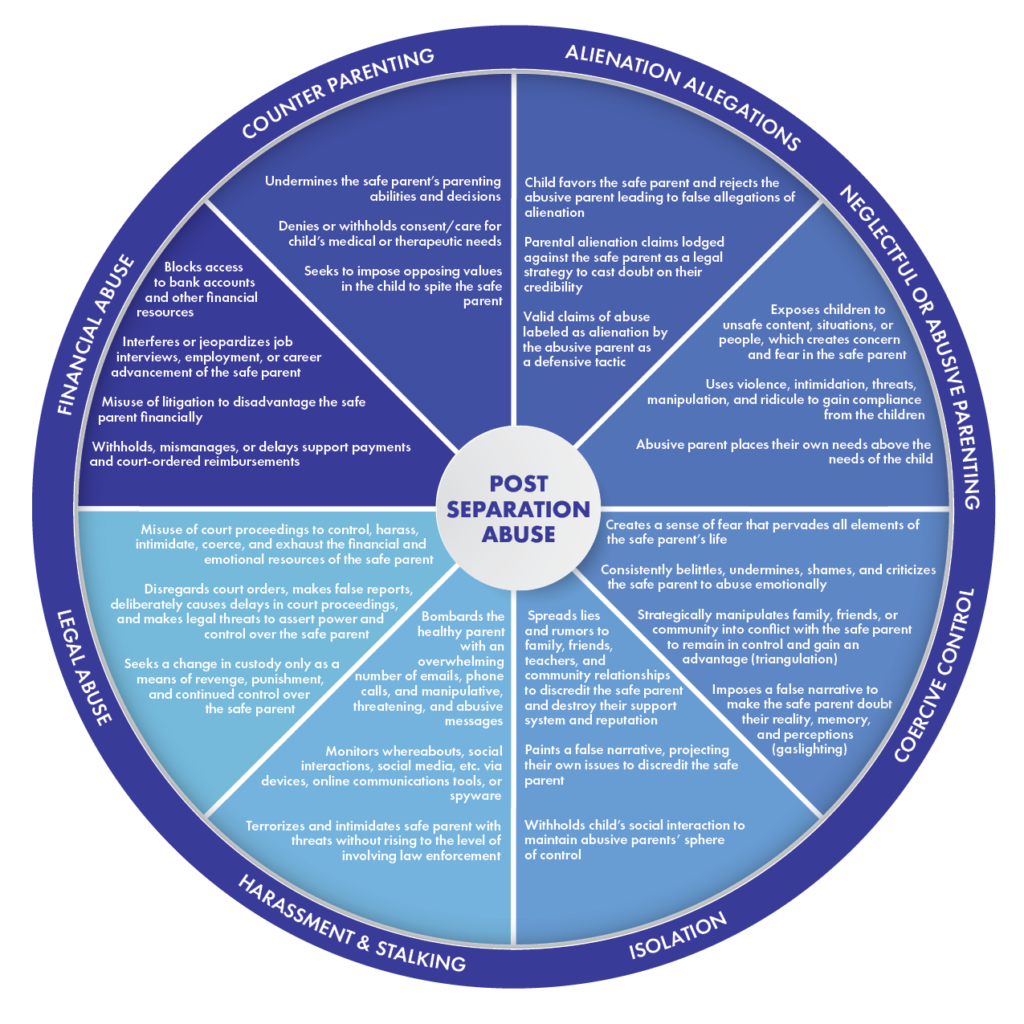
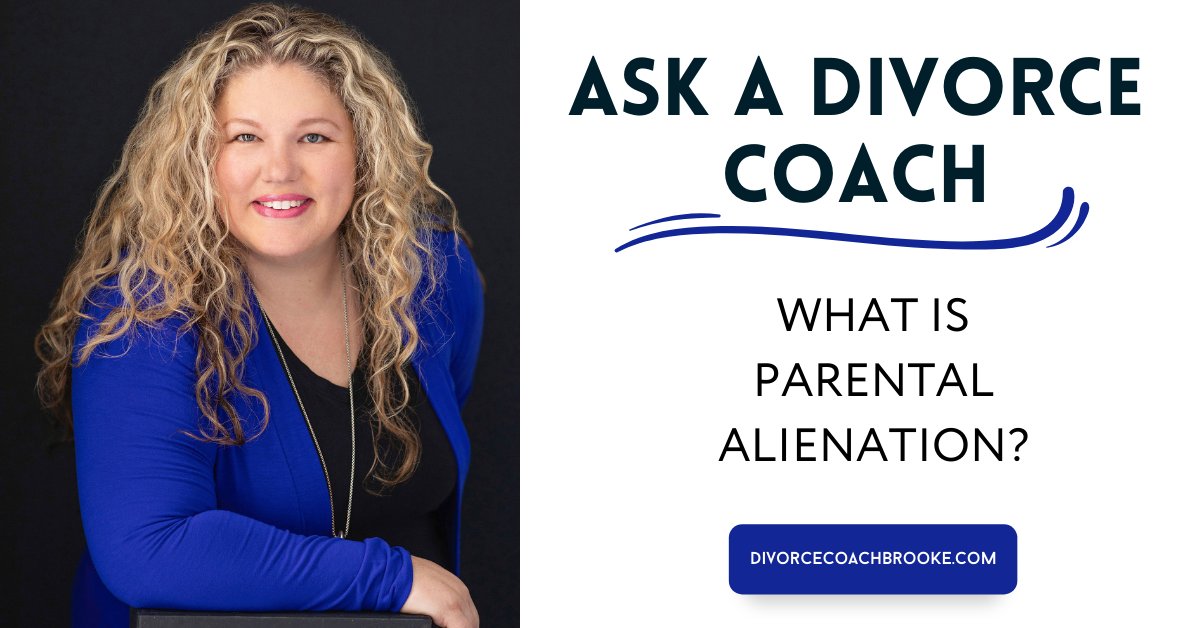
What is “parental alienation?”
What is parental alienation?
Parental alienation is a controversial concept that has been used in family courts. To some, parental alienation is a term used to describe a situation in which one parent (or other family member) tries to turn a child against the other parent. This can involve making negative comments about the other parent, telling the child false or misleading information about the other parent, or even preventing the child from having contact with the other parent. Those people often use that term benignly, not understanding the full history of the phrase or the ways that it is used by abusers as a defense. Because of its broad usage, the term has been successfully used to remove children from a protective parent’s custody and given to the abusive parent.
What is the controversy over parental alienation?
Origins of Parental Alienation and Parental Alienation Syndrome
The concept of parental alienation gained significant attention in the 1980s when psychiatrist Dr. Richard Gardner coined the term Parental Alienation Syndrome (PAS). Gardner described PAS as a condition in which a child becomes irrationally aligned with one parent and denigrates the other without justification. He argued that this was often the result of psychological manipulation by one parent, which led to the child’s estrangement from the other parent.
Dr. Gardner, the psychiatrist who introduced the concept of Parental Alienation Syndrome (PAS) in the 1980s, held highly controversial and troubling views on pedophilia, which have been widely criticized. Gardner argued that pedophilia was not as harmful or deviant as commonly believed and suggested that society overreacted to the issue. He claimed that sexual relations between adults and children have existed throughout history and that, in some cases, children may even enjoy such interactions. These beliefs appeared in some of his writings, where he seemed to downplay the severity of child sexual abuse.
Controversy over the use of PAS
However, the introduction of Parental Alienation Syndrome has been highly controversial. One major point of contention is that PAS was never recognized as an official mental health diagnosis by mainstream psychiatric organizations such as the American Psychiatric Association or the World Health Organization. Critics argue that the concept of PAS oversimplifies complex family dynamics and can be misused in court, particularly in cases involving allegations of abuse.
Gardner’s work has faced significant backlash for failing to adequately distinguish between genuine parental alienation and cases where a child’s rejection of a parent is based on legitimate fear or the result of actual abuse. Critics are especially concerned that PAS has been weaponized in family courts to discredit survivors of domestic violence or child abuse, with some abusers accusing the protective parent of alienating the child when, in reality, the child is distancing themselves for self-protection.
Other Terms used instead of Parental Alientation
Refuse/Resist Dynamic: The refuse/resist dynamic in child custody refers to a situation where a child, often during or after a high-conflict divorce, refuses to spend time with or resists having a relationship with one parent. This behavior can stem from various factors, including the child’s own experiences or feelings, abuse inflicted by the rejected parent, or alleged influence from the other parent (sometimes referred to as parental alienation). Many in the parental alienation movement have relabeled behavior under this phrase as legitimate criticism of parental alienation continues.
Gatekeeping: the behaviors of one parent that control or influence the other parent’s access to their child. This can range from positive gatekeeping, where a parent facilitates a healthy relationship between the child and the other parent, to restrictive or negative gatekeeping, where a parent intentionally limits the other’s involvement in the child’s life. Gatekeeping is often used to mean “alienation” because of the negative connotation of Parental Alienation.
False Allegations of Parental Alienation
One of the most challenging situations for a parent is being falsely accused of parental alienation, especially when they have raised credible allegations of domestic violence or child abuse. In some cases, abusers will allege parental alienation as a defense mechanism to discredit the protective parent and shift attention away from their abusive behavior. This can result in a situation where the victim is re-victimized through the court system, a process sometimes referred to as legal abuse.
An accusation of parental alienation by an abusive father, in particular, can be devastating for your case. Despite the controversy and unsubstantiated claims of this theory, it has a stronghold in the family courts, with judges, attorneys, mediators, custody evaluators, GALS and more believing that parental alienation is a valid and widespread problem.
Even if your ex-partner is abusive, the courts will likely expect you to be overly nice and accommodating to that partner when it comes to custody. Any evidence that you do not like your ex can be used to dismiss any and all claims of abuse by you or your children. You must be strategic and understand how your words and actions can be twisted by the abuser. High-conflict divorce coaches are trained in this area and can help you sort out the allegations and create a plan to move forward.
- Document Everything: Maintaining thorough documentation is crucial when defending against false allegations. Keep a detailed record of all communications with your ex-partner, including emails, text messages, and phone calls. Document any missed visitations or instances where your ex-partner has failed to comply with custody arrangements. If your child has expressed fear or discomfort regarding their other parent, record these instances, but avoid coaching or influencing the child’s statements. It is also important to document any evidence of the abuse you have experienced, such as photos, medical records, police reports, or testimony from witnesses.
- Prioritize Your Child’s Well-being: One of the best ways to combat false allegations is to demonstrate that your actions are focused on your child’s best interests. Courts are more likely to side with a parent who appears to be acting in good faith and prioritizing the child’s welfare. Avoid speaking negatively about the other parent in front of your child, even if you believe the accusations against you are unfounded. Instead, focus on maintaining a positive, healthy environment for your child.
- Use Expert Witnesses: In cases where the allegations of abuse and parental alienation are complex, expert testimony can be incredibly valuable. Look for expert witnesses who can help discredit the theory of parental alienation and who can help substantiate the reasons why a child may resist visitation.
The use of the term “parental alienation” is controversial because it has been criticized for being misused and sometimes used to discount or dismiss allegations of abuse made by one parent against the other in the context of child custody disputes.
Critics argue that the term “parental alienation” can be used to blame the victim of abuse, and that it can be misused to suggest that a child’s reluctance to spend time with a parent is due solely to the other parent’s interference, rather than any abusive behavior by the rejected parent.
In some instances, a parent who is accused of sexual abuse may claim that the allegations are the result of the other parent’s attempts to alienate the child from them, rather than actual abuse. This can create a difficult situation in which the court must determine whether the allegations of abuse are true or whether they are the result of a deliberate attempt to alienate the child from the accused parent. The use of parental alienation in such cases can be particularly problematic if there is evidence that the accused parent has a history of abuse or if there is other credible evidence that supports the allegations.
Critics of the concept of parental alienation argue that it can be used as a tool to silence children who report abuse, by claiming that the allegations are a result of manipulation by the other parent. This can create a dangerous situation in which legitimate claims of abuse are not taken seriously or are dismissed as a result of the use of parental alienation.
The American Psychological Association (APA) recognizes the existence of situations in which a child’s resistance or hostility towards one parent is not justified and may result from psychological manipulation by the other parent. However, the APA does not endorse the use of the term “parental alienation” as a diagnostic label or legal concept. Many in the narcissistic abuse recovery and high conflict divorce coaching space refer to this behavior as “post-separation abuse.”
What are the origins of the parental alienation theory?
The concept of parental alienation has a complex history with origins that can be traced back to the early 20th century. However, the modern theory of parental alienation can be traced back to the work of psychiatrist Richard Gardner in the 1980s.
Gardner coined the term “parental alienation syndrome” (PAS) to describe a set of behaviors in which one parent attempts to alienate a child from the other parent during a divorce or child custody dispute. Gardner argued that the behaviors associated with PAS were often the result of a campaign of denigration by one parent, who would try to turn the child against the other parent through tactics such as badmouthing, withholding contact, or making false accusations.
While Gardner’s work gained some traction in the field of family law, it was also heavily criticized by many mental health professionals who argued that the concept was not supported by solid scientific evidence and that it could be used to justify abusive behavior by parents. Additionally, Gardner’s focus on the behavior of the alienating parent rather than the child’s feelings and experiences was criticized by some as being overly simplistic.
What should I do if I am accused of parental alienation?
Safeguarding Your Case From Parental Alienation
Learn More
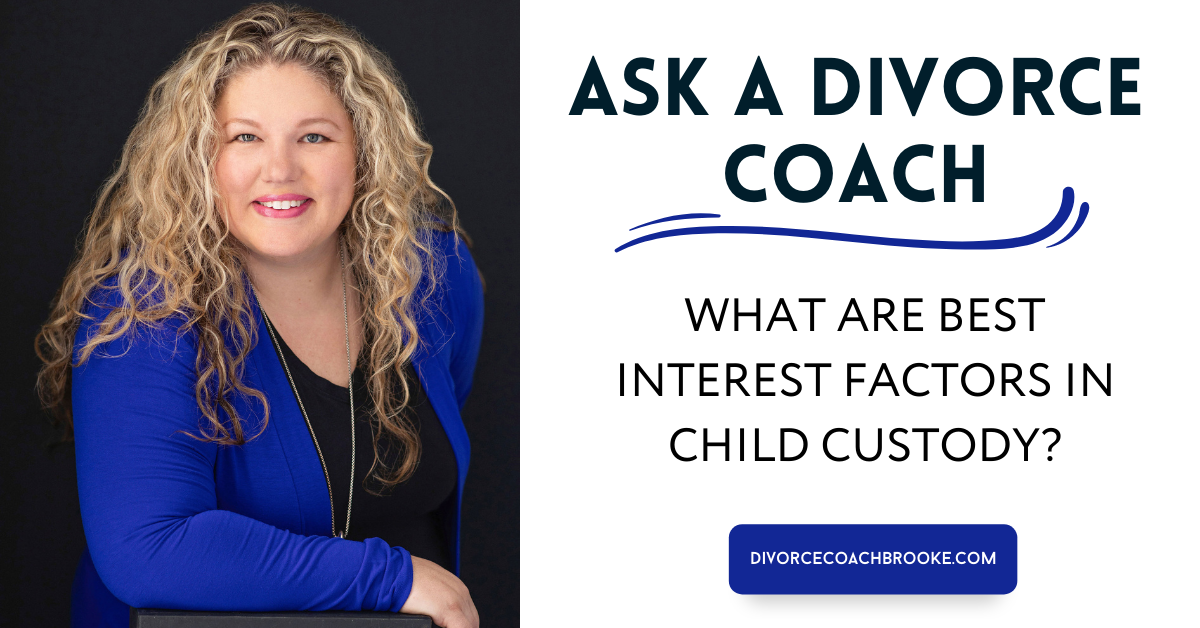
What are Best Interest Factors in child custody?
When courts determine child custody, they use the best interest of the child standard, which considers several important factors to ensure the child’s overall well-being is prioritized. These factors help guide decisions about where the child should live, how much time they will spend with each parent, and who will be responsible for making key decisions in the child’s life. While each case is unique, the following are some of the most commonly used best interest factors that courts consider when determining custody.
What are the best interest factors?
The best interest factors in child custody vary depending the jurisdiction (or location) where the custody dispute is taking place. Each state has its own set of laws regarding custody, and those can generally be found by googling “best interest factors in child custody in [put your state here].” However, there are several common factors that are generally considered by courts when making custody determinations. These include:
-
The child’s age, gender, and developmental stage
The child’s age, gender, and developmental stage play a key role in determining their needs and the type of care required. For example, an infant may need more frequent interaction with the primary caregiver, while an older child may benefit from maintaining strong ties with both parents. Developmental needs can also influence decisions regarding schooling, healthcare, and emotional support. Courts consider how well each parent understands and can meet the child’s needs based on their developmental stage.
-
The child’s relationship with each parent and other important people in their life, such as siblings, grandparents, and extended family members
Courts assess the child’s relationship with each parent and other key individuals in their life, such as siblings, grandparents, and extended family members. A positive, healthy bond with each parent is crucial, as is maintaining strong connections with siblings and other important people. Judges aim to create a custody arrangement that preserves these important relationships, recognizing the emotional and social support they provide to the child. Courts may also take into account the consistency of these relationships over time and how involved each parent has been in the child’s daily life.
-
Each parent’s ability to provide for the child’s physical, emotional, and educational needs
Each parent’s ability to meet the child’s physical, emotional, and educational needs is central to determining the best custody arrangement. This includes providing essentials like food, shelter, and healthcare, as well as emotional support and guidance. Courts will evaluate how each parent can support the child’s education, whether that means helping with schoolwork, attending parent-teacher meetings, or ensuring the child participates in extracurricular activities. The ability to create a nurturing and secure environment that fosters emotional well-being is crucial in these decisions.
-
Each parent’s mental and physical health
A parent’s mental and physical health can significantly impact their ability to care for the child. Courts assess whether a parent is physically and emotionally capable of meeting the child’s needs. If a parent has a mental or physical health condition that affects their ability to provide consistent care, this could influence the custody arrangement. However, courts are also mindful not to discriminate based solely on a diagnosis; they focus instead on how the condition affects the parent’s ability to parent effectively.
-
The child’s preference, if the child is mature enough to express one
In some cases, courts will consider the child’s preference regarding where they want to live, provided the child is mature enough to express a reasoned opinion. The weight given to the child’s preference depends on their age and emotional maturity. While the court considers the child’s input, it ultimately balances their wishes with other factors to ensure the decision is in the child’s best interest.
-
The ability of each parent to provide a stable and consistent home environment for the child
A stable and consistent home environment is essential for a child’s well-being. Courts look at each parent’s ability to offer stability, including a safe living situation, a routine that supports the child’s development, and consistency in caregiving. Stability is particularly important for younger children, who need a structured environment to thrive. Courts may favor the parent who can maintain a stable household, especially if the other parent’s situation is more transient or unpredictable.
-
Each parent’s willingness to encourage and support the child’s relationship with the other parent
A parent’s willingness to encourage and support the child’s relationship with the other parent is a key factor in custody decisions. Courts prefer to grant custody to a parent who fosters healthy co-parenting and ensures that the child has a strong relationship with both parents. If one parent actively discourages or undermines the child’s relationship with the other parent, this behavior could negatively impact their custody outcome. Courts value cooperation and the ability to prioritize the child’s needs over personal conflict. *See Additional Comments below*
-
Any history of domestic violence, substance abuse, or other issues that could impact the child’s safety and well-being.
Finally, the court will carefully consider any history of domestic violence, substance abuse, or other issues that could impact the child’s safety and well-being. If a parent has a history of abuse, substance addiction, or other dangerous behaviors, the court may limit or supervise their custody or visitation rights to protect the child.
These factors are given different weights depending on the state and circumstances. However, it’s really important to understand the best interest factors before developing a parenting plan. It’s also really important as you look at your ongoing relationship with your ex-partner. Domestic violence is A factor in many jurisdictions. But it is not the only factor. (I would argue as would most of my colleagues that it should be the MOST IMPORTANT factor in custody decisions, but it often is not. Abusive parents get court-ordered, unsupervised custody and visitation every single day.)
* Willingness to encourage and support the child’s relationship with the other parent
The willingness of each parent to support the children’s relationship with the other parent is debated and contested in domestic violence spaces. But it is on the books in many places. What this means is that even if a parent threatened to kill the other parent – even if a parent threatened to kill the child – the other parent is theoretically supposed to encourage and support the child’s relationship with the person they consider dangerous. Not doing so can be labeled as “parental alienation” and can jeopardize a protective parent’s entire case. (There are certainly examples of judges recognizing the danger of domestic violence and protecting kids in these cases. It is very important to talk to your attorney about this, and you should ask specifically how to navigate your concerns while also meeting the willingness to encourage relationship best interest factor.)
The complexity of the best interest factors is one of the reasons why communicating with a disordered ex-partner is such an important strategic part of your post-divorce plan. In my case, the judge decided that I didn’t like X (I didn’t – for good reason), but the fact that she could tell hurt my case for several years. I know better now!
A divorce coach can help you locate resources to better educate yourself on your state’s best interest factors so that you can be strategically-minded during your ongoing custody battle.
Learn More
My ex keeps asking for more time. What can I do?
Step 1: Define your desired Outcome
During the first step, we work to define what is concerning you about the behavior and what the ideal outcome would look like. For a parent who is constantly asking to change the schedule, the concern might be consistency for the kids. If you are concerned about safety, these requests for extra time can provoke anxiety. A healthy parent may also be concerned that the disordered parent is going to file for more custodial time because they keep asking for more time. All of these concerns help us develop the desired outcome.
For this example, we’re going to say that the concern is both safety and a fear of the parent filing for more time in the future.
Step 2: Educate about family court and disordered traits
In order to develop an effective strategy, you must educate yourself about both disordered personality traits and family court. While I am unqualified to diagnose any unhealthy parent or partner, many of the parents seeking my services relate to behaviors consistent with having divorced someone exhibiting Cluster B (narcissism, sociopathy, borderline personality) symptoms.
In this specific situation, understanding the way that unhealthy parents want to create drama and arguments over what matters to you is an incredibly important step. Here are some Books to Read after Divorcing a Narcissist. If you say no to a request over additional time, it is likely that the unhealthy parent cues into that as a possible target for ongoing conflict. You will see how this matters when we discuss strategy.
Another important topic to educate yourself on is the realities of family court. 50/50 arrangements are seen as the default in most jurisdictions, even if there aren’t state laws requiring it. If a parent is expressing interest in a more equal parenting plan, the courts will likely, at minimum, hear that request.
Step 3: Brainstorm solutions
Now that we have identified the desired outcome and discussed personality traits and the family court system, it’s time to get creative! During this step, all we are trying to do is get unstuck and start to see that we have many options available to us. It may be tempting during this phase to leave out options because you don’t like them. I would challenge you to keep them on your list as you brainstorm. During the next step, you will pick a strategy that best suits your situation. And as you refine, you may come back to this list to try something new.
For a situation where an unhealthy parent is requesting more parenting time, here is a list of possible solutions.
- Say No to all requests for more time.
- Say No to all requests for more time but express a willingness to consider future requests.
- File a Motion requesting the judge clarify the order.
- Say Yes to all requests for time.
- Start offering more time.
- Start offering more time and express frustration when he doesn’t take the time he’s been offered.
This list is not exhaustive. See if you can come up with some of your own ideas.
Step 4: Develop a Strategy
We’ve gone through the steps and identified several paths forward. Now it’s time to put it all together. This step requires embracing a curiosity mindset. This basically means that you are going into a situation with questions and wondering what will happen rather than being afraid of the What-ifs. There is no right answer! In fact, I would suggest that I probably did all of these in my case! I’m going to analyze each of the options.
Say No to all requests
This seems completely logical if you are concerned with the safety of your children. However, when we apply our education step, we start to understand why this might be a problem. A disordered personality is going to latch on to any “No.” It’s a challenge. It’s an invitation to a fight. If your desired outcome is to minimize requests and stop the fight over more time, this is unlikely to help you achieve your goal. Furthermore, many states look at both parents’ cooperation in timesharing. If you always deny time, you can be labeled as controlling and uncooperative.
Say No to all requests for more time but express a willingness to consider future requests.
If you are going to deny requests for future time, this is likely a better approach. You are still denying the request, but you are doing so in a way that appears cooperative. You can also appeal to the disordered parent’s ego by saying things like “I know that you value consistency” or “Because you want what’s best for our kids.” Even if you don’t believe it, project positive traits onto the disordered parent so that you reduce the conflict. The disordered parent may continue their pursuit, however.
An email template might look like:
“Dear [parent],
Hope you’re doing well. I wanted to reach out in response to your recent request to take the kids on your noncustodial time. I appreciate that you’re interested in spending more time with them, but unfortunately, I’m going to have to say no for now.
As you know, we have a custody agreement in place, and I think it’s important that we stick to it to maintain some consistency for the kids. I don’t want to confuse them by changing things up too much.
I know this might be disappointing for you, and I’m sorry for that. I’m definitely open to talking about things in the future if your situation changes or if you have any other ideas for how we can adjust our custody arrangement to work better for all of us.
Thanks for understanding, and take care!”
File a Motion requesting the judge clarify the order.
You always have the option of going back to court. And the family courts have their place in this marathon. However, court is expensive. In this case, the court could clarify the motion, and the disordered partner may continue to do exactly what they have always done. You are still going to have to find a way to manage the situation on your own. Additionally, going to court exposes you to the potential that he will get more time through a court order. Use court with caution – and once you have solid evidence to present.
Say Yes to all requests for time.
Just like you have the option to say “no,” you also have the option to say “yes.” And for those of us who are conflict averse or accustomed to giving in to our ex’s demands, this can be very tempting. It *is* an option, but it should be considered carefully and only done strategically, not because you are used to ignoring your own wants and needs.
Start offering more time.
You might not see a difference between saying “yes” all the time and offering more time. But they are different! With this, instead of waiting for the disordered parent to ask, you are being proactive. You are taking the fight to him and forcing him to do what he says he wants, which is time. Because we know that these personalities often want the fight more than the actual request, we are creating a different fight. Many parents find that once they start asking the unhealthy parent to take time, they no longer do.
I know this feels scary. I can still feel the fear when I started to do this. But it can work.
Start offering more time and express frustration when he doesn’t take the time he’s been offered.
This is a variation on the above. When I first divorced, I told my ex-husband that I was frustrated when he didn’t take his scheduled overnights. I wasn’t really, but I wanted him to think it was annoying me. He did not take overnights for an entire year. It was a strategy that I was pretty sure would work, and unfortunately, I was talked out of listening to my own instincts about my case. I wish I had done it more, sooner. Offering time was one of the keys to my long-term strategy – and it was effective.
Step 5: Assess and Refine
It takes time to see if a new strategy will be effective. I recommend giving it three or four months to see a change. It’s also important to remember that when we try something new or set different boundaries, it can increase certain behaviors in the other person for a time, but then they burn out.
During this phase, you are keeping a curiosity mindset and collecting data. Once you feel like you have enough information, you can either continue, refine, or try one of your other ideas.
Have a Question about divorce or custody? Ask it here!
Learn More
What are the Best Books to Read after Divorcing a Narcissist?
Divorcing a narcissist or other difficult personality type can be extremely confusing and isolating. It may also be easy to think that the hard part is over, that he will finally leave you – and your children if you have them – alone. Often, it’s only just the beginning.
When I left my disordered ex-husband, I was just beginning to untangle the ten years of marriage to understand what exactly had happened to me. I wanted to be sure I didn’t do it again! So I started reading everything I could about narcissism, psychopathy, and healing. These are some of my favorite resources. I also have a page dedicated to book recommendations when divorcing a narcissist (Click on the image to go to Bookshop.com to order)

Lundy Bancroft has become a world-renowned expert on domestic violence and abusive men. In one of his most well-known books, Bancroft explains the psychology behind controlling behaviors and gives advice for how to extricate yourself from a toxic relationship.
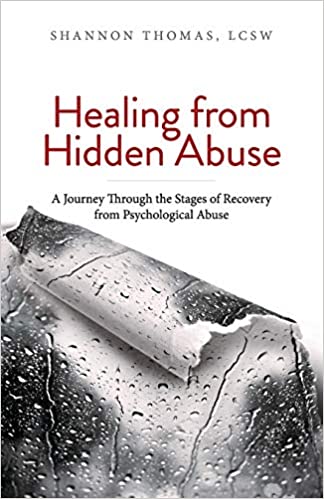
Shannon Thomas‘s book was life-changing for me. I have read and re-read this book (and if you listen to Audiobooks, it sounds like a therapist giving you personal, healing advice). For many people who have been in narcissistic and sociopathic relationships, it can be nearly impossible to describe what has happened to you. There are not always physical marks to explain the abuse. In Healing from Hidden Abuse, Shannon Thomas helps unravel the psychological damage and abuse, making you feel both validated and stronger as you heal.

Not every high-conflict divorce involves a sociopath. But many, many do! And while the word has become over-used to describe every toxic individual, there are more sociopaths in the world than we would like to believe. They are not all in jail and do not all engage in the types of crimes that make for a good Netflix documentary! The Sociopath Next Door is such an incredible book, giving insight into the psychological minds of the disordered. Having the knowledge of how personality-disordered individuals think will help you make better decisions as you face divorce and child custody decisions.

You might think this book would have been a better read BEFORE you met your ex-partner, but it still has invaluable and practical advice! I think it is a great read for anyone who plans to date again, for one. But I also think it can help you profile your ex-partner, which is an important part of the post-separation divorce process.
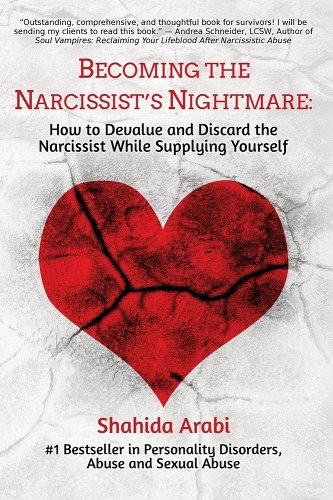
While most of the other books are focused on the disordered partner, this book is focused on those who have survived them! Shahida Arabi‘s book provides practical advice for setting boundaries, engaging in self-care, and empowering yourself to reclaim what you may have lost.
Learn MoreHave a question about high-conflict custody battles or divorcing a narcissist? Submit them here!
